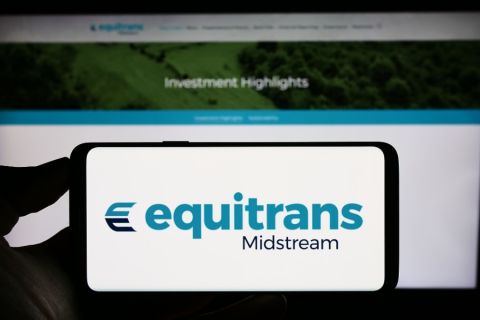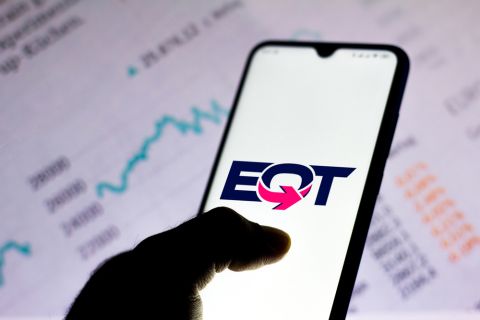ConocoPhillips, Houston, (NYSE: COP) plans to acquire Houston-based Burlington Resources Inc. (NYSE: BR) in a transaction valued at $35.6 billion that will bump it potentially to the No. 2 spot in U.S. proved gas reserve-holdings, behind No. 1 BP Plc (NYSE: BP). In the deal, Burlington shareholders are to receive $46.50 in cash and 0.72 ConocoPhillips share per Burlington share, representing a transaction value of $92 per Burlington share, based on the closing price of ConocoPhillips shares prior to the announcement. Burlington shares were trading at about $90 at press time. At year-end 2004, Burlington had total reserves of 2 billion BOE of which 1.33 billion were proved in the U.S., according to research firm John S. Herold Inc. and U.K. M&A firm Harrison Lovegrove & Co., in their "2005 Global Upstream Performance Review." Of the proved U.S. reserves, 846 million were gas. ConocoPhillips' U.S. proved gas-reserve holdings totaled 1.26 billion BOE. Combined, the companies' year-end 2004 proved U.S. gas reserves totaled 2.11 billion BOE. BP's was 2.35 billion. No. 3 ExxonMobil's (NYSE: XOM) reserves were 2.08 billion. ConocoPhillips held the No. 3 spot in U.S. gas-reserve-holdings at year-end 2004; Burlington held the No. 5 spot, behind Anadarko Petroleum Corp. (NYSE: APC). Burlington's estimated 2005 daily production is approximately 1.9 billion cu. ft. of gas and 91,000 bbl. of oil, or 475,000 BOE. Burlington's North American assets are in the Midcontinent, San Juan Basin and the Western Canadian Sedimentary Basins. Its international assets are in Algeria, China, Colombia, Ecuador, Peru, Argentina, the East Irish Sea and the Dutch North Sea. Pro forma reserves for ConocoPhillips will be 10.5 billion BOE as of year-end 2004, and pro forma 2005 production will be 2.3 million BOE per day. The combination is estimated to have an enterprise value of $135 billion ($106 billion of equity; $29 billion of net debt and preferred securities). Existing ConocoPhillips shareholders will own about 83% of ConocoPhillips following the transaction. ConocoPhillips will fund the acquisition from cash on hand, existing credit facilities, and new bank and bond debt. The company plans to use cash from operations in the years ahead to reduce its outstanding debt. Goldman, Sachs & Co. and Citigroup Global Markets Inc. were financial advisors to ConocoPhillips, while Morgan Stanley and J.P. Morgan Securities Inc. were financial advisors to Burlington. Standard & Poor's has affirmed its A- corporate credit rating and stable outlook on ConocoPhillips, while the credit-rating service placed its BBB+ credit rating on Burlington on CreditWatch with positive implications. S&P expects its ratings on Burlington will be equal to ConocoPhillips when the transaction closes. "This even stronger business profile offsets the near-term burden of considerable leverage undertaken in the acquisition, particularly in light of the likelihood of attractive oil and natural gas prices through 2006," says Standard & Poor's credit analyst John Thieroff. John Herrlin, an analyst with Merrill Lynch, reports that he is moving to a "no opinion" on Burlington as a result of the acquisition announcement. Herrlin reports the purchase price equates to $74,947 per 2005 flowing BOE and $2.97 per thousand cu. ft. of gas equivalent for proved reserves. Recent transactions for U.S. assets have averaged between $2.50 and $3 per thousand cu. ft. of proved, he adds. The new ConocoPhillips will have 2.3 million BOE per day of production, including its share from Lukoil and Syncrude, and 10.5 billion BOE of proven reserves, he notes. "It will be more dominated by E&P-74% capital employed versus 61% pre-deal-and become 'gassier,' moving from 35% to 41% of reserves, and passing ExxonMobil as North America's No. 1 gas producer." Most of Burlington's assets are in North America, so ConocoPhillips' new weighting to assets in OECD (Organisation for Economic Co-Operation and Development) countries will shift from 62% to 69%, he adds. Paul Sankey, an analyst with Deutsche Bank, rates ConocoPhillips a Buy with considerable upside to the current share price, although he believes there are problems for shareholders. "For this to be proved, a brave and aggressive move into nonconventional U.S. gas will take three years. The near-term concern will be that this is a high-priced deal pitched at peak U.S. natural gas prices," Sankey says. Sankey also notes that Jim Mulva, chairman and chief executive of ConocoPhillips, cited high asset prices in a November analyst meeting as a reason not to buy on the decline curve. "But in December he has just paid $18 per BOE for a 20%-per-annum U.S. decline curve. Why not just pitch yourselves as a growth stock?" Sankey says. "U.S. E&P growth names get premium ratings. The continued mention of through-the-cycle attention to return on capital employed with this kind of goodwill burden lacks credibility. The company is clearly an opportunistic growth play on commodity prices. The market is okay with that, if that is what it says on the tin. 'Returns-focused supermajor' is the wrong description and the multiple reflects that." The price of ConocoPhillips shares declined some 10% after the news but had improved to the pre-announcement level at press time. Mulva says, "With this transaction, ConocoPhillips will expand our portfolio of high-quality, low-risk, long-lived gas reserves, and become a leading producer of natural gas in North America. "The transaction also enhances ConocoPhillips' production growth and North American gas-supply position both in the near term, through projects involving conventional and unconventional resources, and in the long term through LNG (liquefied natural gas) and Arctic gas projects." Bobby S. Shackouls, chairman, president and chief executive of Burlington Resources, says the deal "recognizes the substantial value we have created and acknowledges the success of our employees in building a great company with a strong asset base. Of equal importance, this transaction allows our shareholders, customers and employees to participate in the future growth of ConocoPhillips, a company that has the scale and scope to supply consumers from every facet of the oil and gas industry more efficiently." Burlington shares traded at around $20 from 1999 until early 2003, when Shackouls and his team became aggressive in re-profiling the company's profitability. Prior to the ConocoPhillips announcement, the stock closed at around $76. Upon completion of the merger, Shackouls and Steven J. Shapiro, Burlington executive vice resident, finance and corporate development, will retire. Shackouls and William E. Wade, a Burlington director, will join the ConocoPhillips board. Randy L. Limbacher, Burlington executive vice president and chief operating officer, will become executive vice president, North and South America, for ConocoPhillips. William B. Berry, ConocoPhillips executive vice president, E&P, will become executive vice president, Europe, Asia, Africa and the Middle East.
Recommended Reading
Equitrans Midstream Announces Quarterly Dividends
2024-04-23 - Equitrans' dividends will be paid on May 15 to all applicable ETRN shareholders of record at the close of business on May 7.
PrairieSky Adds $6.4MM in Mannville Royalty Interests, Reduces Debt
2024-04-23 - PrairieSky Royalty said the acquisition was funded with excess earnings from the CA$83 million (US$60.75 million) generated from operations.
Baker Hughes Awarded Saudi Pipeline Technology Contract
2024-04-23 - Baker Hughes will supply centrifugal compressors for Saudi Arabia’s new pipeline system, which aims to increase gas distribution across the kingdom and reduce carbon emissions
EQT Declares Quarterly Dividend
2024-04-18 - EQT Corp.’s dividend is payable June 1 to shareholders of record by May 8.
Matador Resources Announces Quarterly Cash Dividend
2024-04-18 - Matador Resources’ dividend is payable on June 7 to shareholders of record by May 17.





